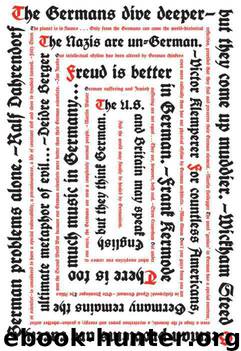The German Genius by Watson Peter

Author:Watson, Peter [Watson, Peter]
Language: eng
Format: epub
Publisher: Harper Collins
Published: 2010-06-21T22:00:00+00:00
THE IMPERIAL KNOW-ALL
Kaiser Wilhelm II also disliked Berlin. For a start, it was far too free-thinking and disrespectful of royalty. Nevertheless, Germany needed a capital to match his ambitions, and he therefore insisted that it must become “the most beautiful city in the world.” To that end he made sure he had a finger in almost every pie: churches, prisons, barracks, hospitals—all bore the imprint of his vision, for good or ill.16
Under him, the most significant building to be constructed in Berlin was scarcely his favorite. The new Reichstag, started in 1884 and dedicated a decade later, was originally intended to be a simple affair on the Wilhelmstrasse. But politicians and architects alike argued that this would not reflect the “newly unified, glorious German nation, on the verge of taking over the leadership of Europe.” The architect, Paul Wallot, charged with “capturing the German spirit in stone,” produced a cross between the Paris Opera and a Palladian palazzo.17
Hardly better was the Siegesallee, an avenue built in 1901 in the Tier-garten and lined with marble busts of Hohenzollern heroes. The Kaiser was extremely fond of the Siegesallee and himself produced drawings for the figures, which should, he insisted, resemble his contemporary friends and supporters of royalty. Which is why the Elector Friedrich I, founder of the Hohenzollern dynasty, came to look like Philipp zu Eulenberg, the Kaiser’s closest friend. Many thought the whole project embarrassing and nicknamed the street “Die Puppenallee”—the avenue of the dolls. The Kaiser’s reputation also suffered: this was a man, Berliners quipped, “who could not attend a funeral without wanting to be the corpse.” 18
Kaiser Wilhelm II saw it as his duty—and his right—to be involved in all aspects of Berlin’s artistic and intellectual life.19 He saw himself as particularly suited to this because he felt he had a gift for drawing and for writing plays. He designed ships and produced a play of his own, titled Sardanapal, in which the central character is a king who sets fire to himself rather than be captured by the enemy. Visiting dignitaries would be forced to sit through performances of his play; among the dignitaries was his uncle, King Edward VII of England, who fell fast asleep until the raucous fire scene, when he suddenly awoke—and called for the fire department to be summoned. In artistic and cultural matters Wilhelm was a backward-looking archconservative, and his constant meddling eventually provoked a backlash.20
In the theater, matters came to a head in 1889. “[That year] was the year of the German theatrical revolution, just as 1789 was the year of the revolution of humanity,” wrote Otto Brahm, founder of Berlin’s Freie Bühne (Free Stage) movement, somewhat overstating his case to make his point. The Free Stage was a private club and not subject to censorship as public theaters were. For that reason Brahm felt able to produce Ibsen’s Ghosts, otherwise banned because it dealt with syphilis. Emboldened, he next tried Gerhart Hauptmann’s Vor Sonnenaufgang (Before Dawn), an exploration of everyday life among the working classes.
Download
This site does not store any files on its server. We only index and link to content provided by other sites. Please contact the content providers to delete copyright contents if any and email us, we'll remove relevant links or contents immediately.
| Belgium | France |
| Germany | Great Britain |
| Greenland | Italy |
| Netherlands | Romania |
| Scandinavia |
Room 212 by Kate Stewart(5094)
The Crown by Robert Lacey(4793)
Endurance: Shackleton's Incredible Voyage by Alfred Lansing(4746)
The Iron Duke by The Iron Duke(4340)
The Rape of Nanking by Iris Chang(4193)
Joan of Arc by Mary Gordon(4085)
Killing England by Bill O'Reilly(3987)
Say Nothing by Patrick Radden Keefe(3966)
I'll Give You the Sun by Jandy Nelson(3421)
Shadow of Night by Deborah Harkness(3344)
Hitler's Monsters by Eric Kurlander(3321)
Mary, Queen of Scots, and the Murder of Lord Darnley by Alison Weir(3192)
Blood and Sand by Alex Von Tunzelmann(3182)
Eleanor & Park by Rainbow Rowell(3143)
Darkest Hour by Anthony McCarten(3113)
Margaret Thatcher: The Autobiography by Thatcher Margaret(3069)
Book of Life by Deborah Harkness(2914)
Red Famine: Stalin's War on Ukraine by Anne Applebaum(2912)
The One Memory of Flora Banks by Emily Barr(2850)
